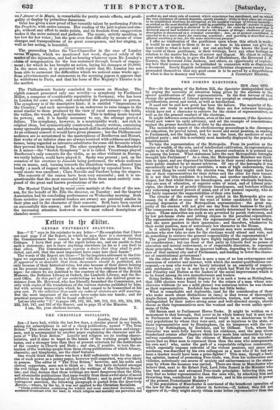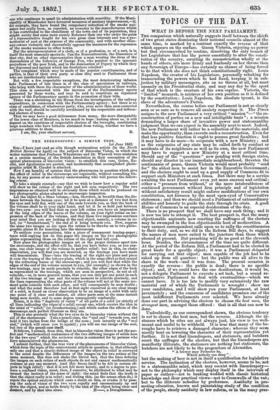THE COMING ELECTIONS.
29th June 1852.
Sin—At the passing of the Reform Bill, the Spectator distinguished itself by urging the necessity of attention being given by the electors to the special qualifications of their representatives. In the first fervour of that change the profession of Liberal opinions was accepted as comprehending all qualifications, moral and social, as well as intellectual.
It need not be said how great has been the failure. The majority of Re- formers are ready to acknowledge that there are few reformed boroughs which have not a character to retrieve for the choice of representatives, as well as for the general conduct of the elections.
It might influence some selections, even at the last moment, if the Spectator would now renew its early advocacy, and set the example of remonstrance against the grosser derelictions of duty by the electors.
The melancholy aspect of the electioneering proceedings is the disrespect for education, for proved talent, and for moral and social position, in sending to Parliament, not the highest, but, to say the least, the mediocre of each political party ; and this is certainly moat markedly displayed by the popular constituencies.
To take the representation of the Metropolis. From its position as the centre of wealth, of the arts, and of intellectual cultivation, its representation ought to be of the highest order ; but by general confession it is pointed out as among the lowest. What statesman have the new Metropolitan boroughs brought into Parliament ? As a class, the Metropolitan Members are third- rate in talent, and are disgraced by blemishes in their moral character which their public conduct by no means retrieves. Of one of the boroughs it was sarcastically said by a rejected candidate, a man of high endowments, that the worst thing he could wish the electors was, that they might each have one of their representatives for their debtor and the other for their tenant. It is not that this candidate is a butcher, and another candidate a linen- draper, but that whilst there are linendrapers, and even wholesale butchers, who are men of education, of superior order of mind, and of Liberal prin- ciples, the choice is of grossly illiterate linendrapers, and butchers without any redeeming natural powers of mind, and of low general capacity, who do not fairly represent the respectabilities of their own trades.
The returns of the numbers of votes polled in the Metropolis give one reason (be it effect or cause of the want of better candidates) for the in- creasing depression of the Metropolitan representation : the great ma- Tjority of the electors will not give one day from their business to the poll. he consequence is, that the elections are mostly determined by minorities of voters. Those minorities are such as are governed by parish vestrymen, and by low pot-house clubs andjobbing cliques in the parochial expenditure. The representatives are therefore the representatives of the lowest bodies, and the mere panders to their ignorances ; and therefore, whatsoever be their social position, men of notoriously low character in the House.
Is it utterly beyond hope that, if emineat men were nominated, those electors who now take no care for the elections would attend and vote, and do something to retrieve the general respectability of the representation ? The great Conservative party have highly important principles in hand for consideration ; but can those of that party in Lincoln find no person of education and mental endowment, or of respectable discretion, to represent those principlea,. rather than an ignorant buffoon, degrading to the constitu- ents of that ancient city and of Parliament, and tending to lower the charac- ter of constitutional government ? On the other side of the House is seen a man of no less extravagance and coarseness of exterior and manner, with which the mental qualifications cor- respond,—a man who would be barely tolerated in an assembly of respect- able mechanics; yet he is sent by a city which had Watt for its neighbour and Priestley and Hutton as the leaders of the social improvement which is to be found among its own manufacturers and traders. Going farther, what a public disgrace it is in such a town as Nottingham, that 1200 electors were found to vote for the return of a man whose mis- chievous wildness (to use a mild phrase) was notorious before he was chosen as their representative. Rochdale has done but little better. What is remarkable and deplorable, (and for the consideration of those who make much about distinctions in race,) is that towns of thoroughly Anglo-Saxon population, whose manufacturers, traders, and artisans, are distinguished by their native strong sense and well-directed energy, should choose as their representatives men the weakest and the worst unfair speci- mens of Celts.
Old Sarum sent to Parliament Horne Tooke. It might be written on a monument to that borough, that never in its whole history had it sent men to Parliament whose measures if enacted would be so mischievous to the very populations by whom they were sent, and so injurious to the state, as those representatives sent by Birmingham, (in its tamperers with the cur- rency,) by Nottingham, by Rochdale, and by Oldham. York, where his character was more fully known from his residence, sent the man whom Sunderland retains after displays which have made him unbearable by large railway constituencies. Can the citizens of Manchester and its manufac- turers find no fitter man to represent them than the man who misrepresents his own sect ? who, under the garb of a respectable religious community, which especially imposes restraint of the violent passions, and peace and meekness, was described by his own colleagues as a man who if he had not been a Quaker would have been a prize-fighter ? This man, though a lead- ing agitator, instead of promoting Free-trade, was, from his indiscretion and violence, notoriously one source of anxiety and embarrassment to the states- man by whom the measure was carried. There are those in Manchester who believe that, next to Sir Robert Peel, Lord John Russell is the Minister who has best sustained and advanced Free-trade principles : believing this, can they find no better representative than the man who, by attacking him and thwarting him, contributed to his overthrow, and to the accession to power of the present Protectionist Ministry ? i If the population of Manchester is convinced of the beneficent operation of the law for the regulation of labour in factories,—if, indeed, they did not approve of it,—they might surely obtain some better representative than the
one who continues to assail its administration with scurrility. If the Muni- cipality of Manchester have favoured measures of sanitary improvement,—if, for example, they have found the compulsory reduction of the smoke nui- sance has really been, as reported, an economy to the manufacturers whilst it has contributed to the cleanliness of the town and of its population, they might surely find some more seemly Reformer than one who under the guise of a representative fought for his own gross class interests and was a pro- tectionist of soot at the expense of the community, and with another chim- ney-owner violently and successfully opposes the measures for the repression of the smoke nuisance in other towns. But the misrepresentation of a cloth, or of a profession, or of a sect, is in itself the most unseemly spectacle. Can the Nonconformists, the Dissenters of that city, find no other representative than a man wearing the dress of the descendants of the followers of George Fox, who panders to the ignorant prejudices of the poor Irish, and to the domination of Popery by which they are depressed and against which his forefathers rebelled? The complaint which may be made of the popular constituencies, and of parties, is that of their own party or class they send to Parliament those who are intellectually inferior. But with a few respectable exceptions, the most deteriorating infusion into Parliament of late times is of the class of speculators in railways, who bring with them the chararacter of the admininistration of those works. This class is connected with the increase of the Parliamentary agents generated by those works, and may be said to constitute an organized agency of the Parliamentary agents in the promotion of their bills. There was a shrinking in the House from the investigation of the railway expenditure, in connexion with the Parliamentary agency ; but there is no class of candidates, of whatsoever party, who, even more than men connected with the turf, should be carefully scrutinized by the respectable and influen- tial electors of towns.
That we may have a good deliverance from many, the more disreputable of the lower class of Members, is too much to hope : looking about us, it will depend on the exertions of respectable electors of the boroughs, constituting large numbers who have hitherto abstained from voting, whether we have a grievous addition to them.



























 Previous page
Previous page